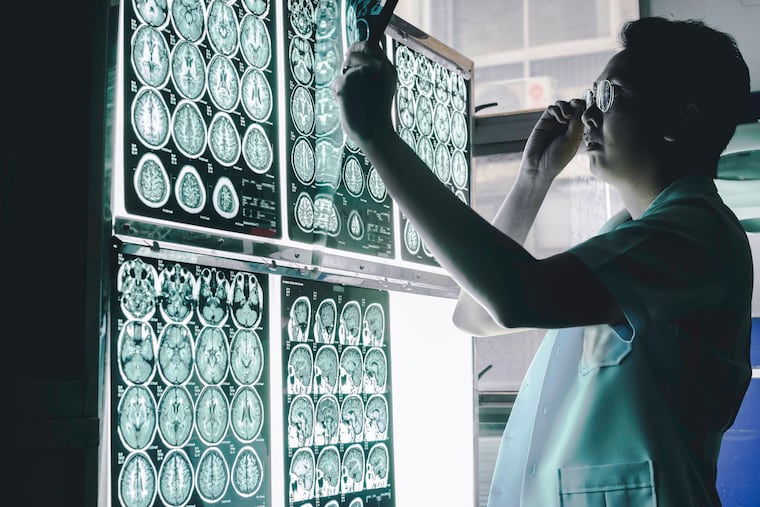Diagnoses of early-onset dementia are growing, insurer reports
Rates were especially high in Pennsylvania and New Jersey.

Diagnosis rates of early-onset dementia and Alzheimer’s disease tripled between 2013 and 2017, with Pennsylvania and New Jersey among the states most affected, according to the Blue Cross Blue Shield Association.
Its new report, released Thursday morning, is based on an analysis by the insurer of its claims data on 48 million commercially insured subscribers. It measured dementia diagnoses among subscribers ages 30 to 64. Dementia is considered early-onset when it occurs before age 65. Alzheimer’s is a form of dementia.
The insurer found that the rate of early-onset dementia and Alzheimer’s diagnoses increased from 4.2 per 10,000 adults 30 to 64 in 2013 to 12.6 per 10,000 adults in that age group in 2017. That converts to an increase from 0.042% to 0.13%, so these diagnoses are still very rare.
The average age of a person with one of these diagnoses was 49.
The insurer estimated that 131,000 commercially insured people had been diagnosed with early onset dementia or Alzheimer’s. It said the Alzheimer’s Association estimates that 200,000 Americans have these diagnoses.
Brian Harvey, executive director of the association’s Health of America Project, said early-onset dementia can be especially demanding for caregivers, and can lead to “depression, social isolation, and financial stress.”
The report is a snapshot of diagnoses at a particular time, not an analysis of new diagnoses. “Therefore,” the report said, “much of the growth in the diagnosis of these conditions over time can be attributed to the accumulation of people who are diagnosed with the condition and remain within the commercially [insured] population during the study period rather than to an actual increase in the rate of diagnosis year over year.”
David Wolk, a neurologist and co-director of the Penn Memory Center, said early-onset dementia may have been under-reported in the past. Doctors are more likely to know about it now and are in general diagnosing dementia earlier in its course, he said. He knew of no reason to suspect that early dementia is actually more common now.
Claims data can be flawed because it is not representative of the whole population, which also includes uninsured patients and people covered by Medicaid, Wolk said. Primary-care doctors may be less skilled at diagnosing dementia than the experts who typically are involved in clinical trials. Early-onset dementias, he said, “really are diagnoses that require the expertise of someone who sees a lot of memory disorder patients.”
Alzheimer’s and forms of frontotemporal dementia are the most common forms of dementia among people under 65, he said. Diagnoses are commonly made in the late 50s and early 60s. There is one genetic form of Alzheimer’s that strikes very young patients, often in their 30s and 40s.
Pennsylvania and New Jersey were among a group of states in the Blue Cross report with the highest rates of early-onset dementia. That range ran from 9.7 to 13 cases per 10,000 people 30 to 64. The group also included several Southern states. The lowest rates were among states in the country’s northern tier, from Wisconsin west, as well as Colorado and Utah.
Independence Blue Cross, which operates in Southeastern Pennsylvania, said the rate of early onset Alzheimer’s and dementia in its coverage area increased by 83% for its members ages 30 to 44; 50% for members ages 45 to 54; and, 40% for members 55 to 64 from 2014 to 2017. That time period is one year shorter than the one analyzed in the national report. Rates in 2017 were comparable to or lower than the rates in the national report.
Eighty-six percent of patients in the national study received brain imaging, and 57% filled a prescription for an antidepressant medication in the year before diagnosis with early-onset dementia or Alzheimer’s, suggesting some patients showed symptoms before diagnosis.
In a written release, Richard Snyder, chief medical officer and executive vice president of facilitated health networks for Independence Blue Cross, called the study results “concerning.”
“While the underlying cause is not clear,” he added, "advances in technology are certainly allowing for earlier and more definitive diagnosis. Regardless, those who develop dementia or Alzheimer’s at an early age will likely require care-giving, either from family members or health-care providers. The time, cost, and impact on families can be significant and can require additional support as these diseases progress.”
Ginny Calega, a geriatrician and vice president of medical affairs at Independence, said she thought increasing awareness of dementia among people of all ages may have led to an increase in screening for the condition.